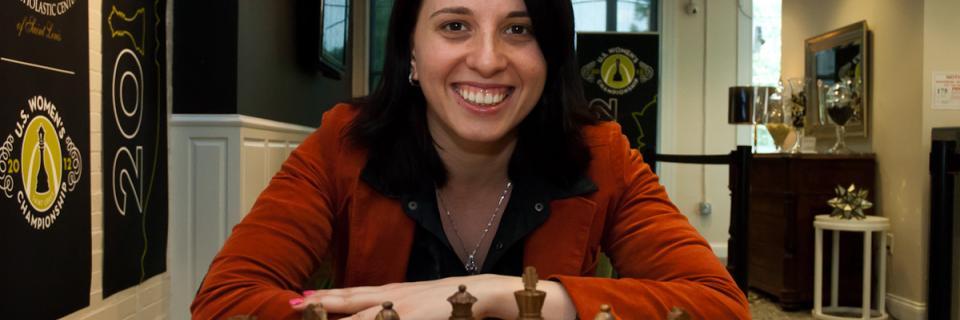Meet the Players: Iryna Zenyuk
 Iryna Zenyuk balances chess with a rigorous academic life.
Iryna Zenyuk balances chess with a rigorous academic life.
By Brian Jerauld
As we lead up to the 2013 U.S. Championships, we'll be running a series of question-and-answer pieces designed to get you better acquainted with this year's field. Introducing: WIM Iryna Zenyuk.
You mentioned how the Internet has democratized chess by making game databases easily available. You also take lessons from your coach in the Ukraine over Skype. What are your thoughts on how technology is changing the way chess is played today?
The chess culture is changing where technology plays a big role by bringing the quality of chess to a whole new level. I remember discussing board games with bridge players at the 1st World Mind Games a few years ago whose main argument to why bridge is superior to chess was that engines can never solve bridge as there is human element to it. I think of branching of chess variations in a typical game as being fractal (i.e. self-similar) and resembling natural systems such as snowflakes, trees and coastlines. Like these natural systems chess is extremely complex in its design and solving it by brute force will require not only quantum computing but also brilliant minds. Thus, I am not too worried about technology drastically changing the way chess is played today, but it does have profound impact on culture, training and preparation we see nowadays. Overall, with computer engines and training tools available we see more players becoming very good at a very young age. Clearly, geography becomes less of a factor with a current No. 1 chess player and World Championship runner-up, Magnus Carlsen being one example, from Norway, which is not on the list of top-10 chess countries. But these are positive things, and I am happy to be part of the era where these changes are taking place!
Do you think the easy access to chess will help see greater representation by countries who have otherwise gone unrepresented?
I definitely hope so. Let me give you one example. Over spring break I went on a University trip to a children's home Urukundo in Rwanda. I met many wonderful people and absolutely loved the local hospitality of this Central African country. Anywhere I went there was always someone who wanted to play a friendly chess game. For example, when visiting the CMU campus there, a local student challenged me to a match, and I was very surprised when he pulled out a tournament chess set from his back-pack. He played fast, confident chess and knew his openings well, and this was no accident as nowadays you can improve your game from the Internet. Surely, there is more to it than getting access to information; there has to be some kind of chess infrastructure built: chess in schools, in everyday life, access to tournaments, parents encouragement etc. but this is as good as an early step can be. If people like playing chess and are willing to spend their time on the game then with Internet and access to chess information we will surely see chess being less geographically polarized and see more stories of chess changing people's lives and open not-thought of before opportunities and make the world a friendlier place.
Many players balance chess with professional jobs or higher education. But you’re balancing the highest level of chess with the highest level of schooling – a doctorate program at Carnegie Mellon University. How do you prioritize between finals and the national championship?
The U.S. Women's Championship is the event of the year for me, so I try my best to prepare well for it. Many of my friends and family are rooting for me and this adds responsibility as well as motivates me to do well. My responsibility as a fourth year PhD student in the lab is mostly research, so finals do not burden my chess preparation as I haven't been taking any classes in the past two years or so.
Your hope is to advance renewable energy technology through your work in mechanical engineering. You mentioned chess is your passion, but engineering is how you see yourself giving back to society. Does that mean chess is nearing its endgame in your life?
Chess has always been a big part of my life, and it might not be the top priority now or in the future, but I believe one can always find time for something that one likes doing. Also, I am very passionate about the research I am doing in electrochemistry and energy storing devices and am planning to remain in academia - eventually getting a tenure-track faculty position, which is extremely competitive and requires a high degree of dedication. Academic research and chess are very similar if one comes to compare them. They both are intellectually stimulating and competitive. To become good in either endeavor one needs to spend thousands of hours in deliberate practice. What I really like about chess and academia careers as there are objective factors to determine your rank, in chess being rating and in academia being your publications. Both activities take place in relatively small communities; it is almost like being a part of a big family. Most importantly, the two fields are all about solving problems, and it is no surprise that I really enjoy both.
Beyond chess and renewable energy, how many more hours do you have left in the day? What do you do with them?
There are rhythms to a working life. Certain months and weeks are filled with high-priority research tasks, weekends included, then I reluctantly occupy myself with any distractions, as these are very productive times. When I am not in deep-work mode or not at chess tournaments there is time for reflection, physical activity such as intramural volleyball leagues and dance classes, social life, TV, cooking and studying the Mandarin language.
